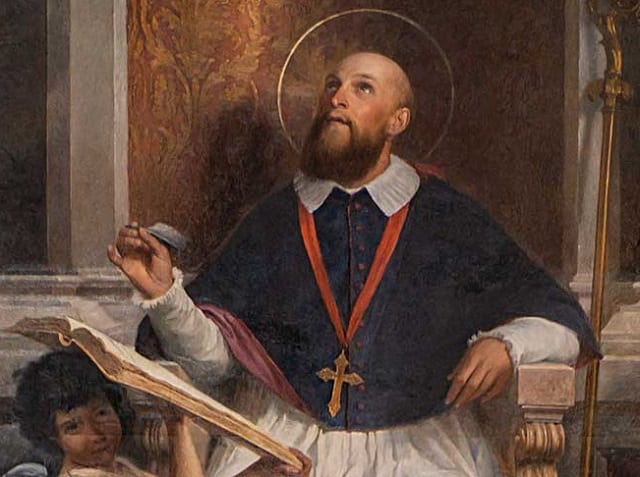
This is one of a series of extensive excerpts (with my occasional commentary) from The Catholic Controversy (1596): a classic of Catholic apologetics (originally a collection of pamphlets), written by St. Francis de Sales (1567-1622): a Doctor of the Church [see all the installments by searching “Salesian Apologetics #” on my blog sidebar search function]. Any comments of mine (apart from lists of related links) will be in blue. The rest is from the online, public domain text (3rd revised edition, New York: Benziger Brothers, 1909; translated by Henry Benedict Mackey, O.S.B.).
What I present is an edited abridgment, designed for modern readers: so I will dispense with the constant tedious use of ellipses (“. . .”). I will cite the section of the book used, so that anyone who desires it may consult the full text and/or particular contexts, patristic references (which I omit), etc. I will follow the custom of my paperback TAN Books edition: of italicizing scriptural passages.
*****
Part II, Article VI: Chapter 2: Resolution of a Difficulty
But a great proof of the contrary, as our adversaries think, is that, according to S. Paul: No one can lay another foundation but that which is laid : which is Christ Jesus [1 Cor 3:11]; and according to the same we are domestics of God ; built upon the foundation of the Apostles and Prophets, Jesus himself being the chief corner-stone [Eph 2:19-20]. And, in the Apocalypse [Rev 21:14],| the wall of the holy city had twelve foundations, and in these twelve foundations the names of the twelve Apostles. If then, say they, all the twelve Apostles are foundations of the Church, how do you attribute this title to S. Peter in particular ? And if S. Paul says that no one can lay another foundation than Our Lord, how do you dare to say that by these words : Thou art Peter, and on this rock I will build my church [Mt 16:18], S. Peter has been established as foundation of the Church ? Why do you not rather say, asks Calvin, that this stone on which the Church is founded is no other than Our Lord ? Why do you not rather declare, says Luther, that it is the confession of faith which Peter had made ?
But in good truth it is an ill way of interpreting Scripture to overturn one passage by another, or to strain it by a forced interpretation to a strange and unbecoming sense. We must leave to it as far as possible the naturalness and sweetness of the sense which belongs to it. In this case, then, since we see that Scripture teaches us there is no other foundation than Our Lord, and the same teaches us clearly that S. Peter is such also, yea and further that the Apostles are so, we are not to give up the first teaching for the second, the second for the third, but to leave them all three in their entirety. Which we shall easily do if we consider these passages in good faith and sincerely.
Now Our Lord is in very deed the only foundation of the Church ; he is the foundation of our faith, of our hope and charity ; he is the foundation of all ecclesiastical authority and order, and of all the doctrine and administration which are therein. Who ever doubted of this ? But, some one will say to me, if he is the only foundation, how do you place S. Peter also as foundation ? ( 1 .) You do us wrong ; it is not we who place him as foundation. He, besides whom no other can be placed, he himself placed him. So that if Christ is the foundation of the Church, as he is, we must believe that S. Peter is such too, since Our Lord has placed him in this rank. If any one besides Our Lord himself had given him this grade we should all cry out with you : No one can lay another foundation hut that which is laid. (2.) And then, have you well considered the words of S. Paul ? He will not have us recognise any foundation besides Our Lord, but neither is S. Peter nor are the other Apostles foundations besides Our Lord, they are subordinate to Our Lord : their doctrine is not other than that of their Master, but their very Master’s itself.
Thus the supreme charge which S. Peter had in the militant Church, by reason of which he is called foundation of the Church, as chief and governor, is not beside the authority of his Master, but is only a participation in this, so that he is not the foundation of this hierarchy besides Our Lord but rather in Our Lord : as we call him most holy Father in Our Lord, outside whom he would be nothing. We do not indeed recognise any other secular authority than that of His Highness [of Savoy], but we recognise several under this, which are not properly other than that of His Highness, because they are only certain portions and participations of it.
(3.) In a word, let us interpret S. Paul passage by passage : do you not think he makes his meaning clear enough when he says : You are built upon the foundations of the Prophets and Apostles ? But that you may know these foundations to be no other than that which he preached, he adds : Christ himself being the chief corner-stone. Our Lord then is foundation and S. Peter also, but with so notable a difference that in respect of the one the other may be said not to be it. For Our Lord is foundation and founder, foundation without other foundation, foundation of the natural. Mosaic and Evangelic Church, foundation perpetual and immortal, foundation of the militant and triumphant, foundation by his own nature, foundation of our faith, hope and charity, and of the efficacy of the Sacraments.
S. Peter is foundation, not founder, of the whole Church ; foundation but founded on another foundation, which is Our Lord ; foundation of the Evangelic Church alone, foundation subject to succession, foundation of the militant not of the triumphant, foundation by participation, ministerial not absolute foundation ; in fine, administrator and not lord, and in no way the foundation of our faith, hope and charity, nor of the efficacy of the Sacraments. A difference so great as this makes the one unable, in comparison, to be called a foundation by the side of the other, whilst, however, taken by itself, it can be called a foundation, in order to pay proper regard to the Holy Word. So, although he is the Good Shepherd, he gives us shepherds [Eph 4:11] under himself, between whom and his Majesty there is so great a difference that he declares himself to be the only shepherd [Jn 10:11; Ezek 34:23].
At the same time it is not good reasoning to say : all the Apostles in general are called foundations of the Church, therefore S. Peter is only such in the same way as the others are. On the contrary, as Our Lord has said in particular, and in particular terms, to S. Peter, what is afterwards said in general of the others, we must conclude that there is in S. Peter some particular property of foundation, and that he in particular has been what the whole college has been together. The whole Church has been founded on all the Apostles, and the whole on S. Peter in particular ; it is then S. Peter who is its foundation taken by himself, which the others are not. For to whom has it ever been said : Thou art Peter, &c. ? It would be to violate the Scripture to say that all the Apostles in general have not been foundations of the Church. It would also be to violate the Scripture to deny that S. Peter was so in particular. It is necessary that the general word should produce its general effect, and the particular its particular, in order that nothing may remain useless and without mystery out of Scriptures so mysterious. We have only to see for what general reason all the Apostles are called foundations of the Church : namely, because it is they who by their preaching have planted the faith and the Christian doctrine ; in which if we are to give some prerogative to any one of the Apostles it will be to that one who said : I have laboured more abundantly than all they [1 Cor 15:10].
And it is in this sense that is meant the passage of the Apocalypse. For the twelve Apostles are called foundations of the heavenly Jerusalem, because they were the first who converted the world to the Christian religion, which was as it were to lay the foundations of the glory of men, and the seeds of their happy immortality. But the passage of S. Paul seems to be understood not so much of the person of the Apostles as of their doctrine. For it is not said that we are built upon the Apostles, but upon the foundation of the Apostles — that is, upon the doctrine which they have announced. This is easy to see, because it is not only said that we are upon the foundation of the Apostles, but also of the Prophets, and we know well that the Prophets have not otherwise been foundations of the Evangelical Church than by their doctrine.
And in this matter all the Apostles seem to stand on a level, unless S. John and S. Paul go first for the excellence of their theology. It is then in this sense that all the Apostles are foundations of the Church ; but in authority and government S. Peter precedes all the others as much as the head surpasses the members ; for he has been appointed ordinary pastor and supreme head of the Church, the others have been delegated pastors intrusted with as full power and authority over all the rest of the Church as S. Peter, except that S. Peter was the head of them all and their pastor as of all Christendom.
Thus they were foundations of the Church equally with him as to the conversion of souls and as to doctrine; but as to the authority of governing, they were so unequally, as S. Peter was the ordinary head not only of the rest of the whole Church but of the Apostles also. For Our Lord had built on him the whole of his Church, of which they were not only parts but the principal and noble parts. “Although the strength of the Church,” says S. Jerome, “is equally established on all the Apostles, yet amongst the twelve one is chosen that a head being appointed occasion of schism may be taken away.” “There are, indeed,” says S. Bernard to his Eugenius, and we can say as much of S. Peter for the same reason, “there are others who are custodians and pastors of flocks, but thou hast inherited a name as much the more glorious as it is more special.”
***
Related Reading:
***
Photo credit: St. Francis de Sales [Bosco Austalasia / Salesian Journeying with the young]
***













